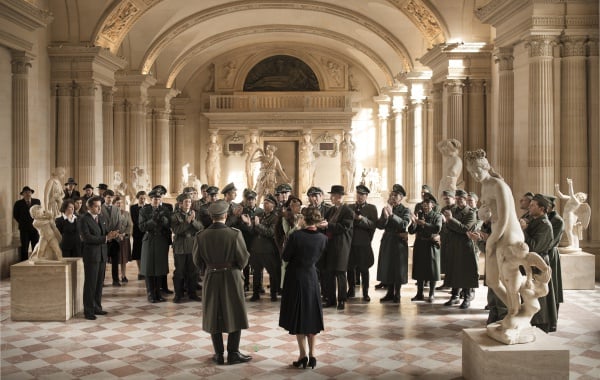
Still from Francofonia.
Image: Courtesy of Music Box Films.
11 minutes into Francofonia, the Russian filmmaker Alexander Sokurov’s lyrical meditation on the cultural and humanistic significance of the Louvre, Sokurov inserts footage of Hitler orienting himself in newly occupied Paris on June 23, 1940. The Führer stands in his car in the Place de la Concorde and gazes toward the Tuileries and along the rue de Rivoli. “Where is the Louvre?” he asks like any other tourist, Sokurov himself perhaps impersonating his rasp. “Ah! There’s the Louvre! How good that it’s there. It always fascinated me it’s where it belongs.”
In that alone, Sokurov concurs with Hitler. “Who needs France without the Louvre? Or Russia without the Hermitage?” the director speculates as, resuming his voiceover musings, he invokes his 2002 Russian Ark. As that film’s narrator also, Sokurov ghosted through 33 rooms of the Russian state museum at the Winter Palace in St. Petersburg.
Still from Francofonia.
Image: Courtesy of Music Box Films.
Though the digressively essayistic Francofonia is less formally innovative than Russian Ark, which famously comprises a single, 91-minute Steadicam shot, it is haunting in its own right. It segues from photos of Leo Tolstoy and Anton Chekhov on their deathbeds (“the fathers” falling asleep and leaving the 20th century to “hard-hearted children”) to an aerial search for the Louvre, thence to a montage of archival footage—of Pétain and his pro-German Vichy cabinet, of besieged Leningrad as well as Paris—and sepia-toned docu-fiction sequences (in which the projected film’s sound strip is visible) about the initially uneasy meetings between the French Republican civil servant and the German nobleman who kept the Louvre’s collection intact.
Hitler and fellow art lovers Göring, Goebbels, and Ribbentrop had intended to pillage the Louvre. They were thwarted by the enforced collaboration of Jacques Jaujard (played by Louis-Do de Lencquesaing), the director of the French national museums during the Occupation, and Count Franziskus Wolff-Metternich (Benjamin Utzerath), the art historian charged with the “Kunstschutz” principle of protecting (or looting) art during wartime.
Jaujard had moved the Louvre’s portable works to spacious Loire Valley chateaux prior to France’s fall. A Resistance contact, he defied Vichy in refusing to surrender the nation’s art treasures. Metternich defied Ribbentrop’s orders to return them to Paris from where they would have been shipped to Germany. He was recalled in disfavor to Berlin. When Sokurov, offscreen, interrupts the two men chatting, he tells them their futures: Jaujard will assist Metternich with his de-Nazification; both will receive the Legion d’Honneur.
Still from Francofonia.
Image: Courtesy of Music Box Films.
Self-consciously “meta,” Francofonia also shows Sokurov on screen as a shadowy figure in his office, Skyping the captain of a storm-lashed ocean-going container ship with a cargo of museum art—a metaphor, for the Louvre’s imperilment under the Nazis, that doesn’t quite work. Napoléon Bonaparte (Vincent Nemeth) and Marianne (Johanna Korthais Altes), the symbol of the Republic, wander the Louvre’s halls. The Emperor boasts how he filled them with the ancient monuments he bought or stole from his imperial conquests, or at least those that didn’t sink the ships transporting them from Basra, say, to Marseille.
Irony piles on irony, ambiguity on ambiguity, in Francofonia. Denouncing Vichy, Sokurov begs the question: what if France had fought on and his beloved Louvre had been destroyed by bombardments? He extols art’s role in preserving through portraiture “the human stock of Europe” (a necessity, he says, unknown in the Muslim world), but only feints at relativizing the preservation of art and life. France was lucky, he says, that Germany acknowledged its right to exist, adding, “What will become of those whose human nature she does not acknowledge?” Footage of a Russian man rescuing a bleeding little girl supports the reference he is making to Bolshevik Russia. What, then, of France’s Jews who suffered much worse than the ravages of kunstschutz?
Francofonia opens on Friday, April 1.